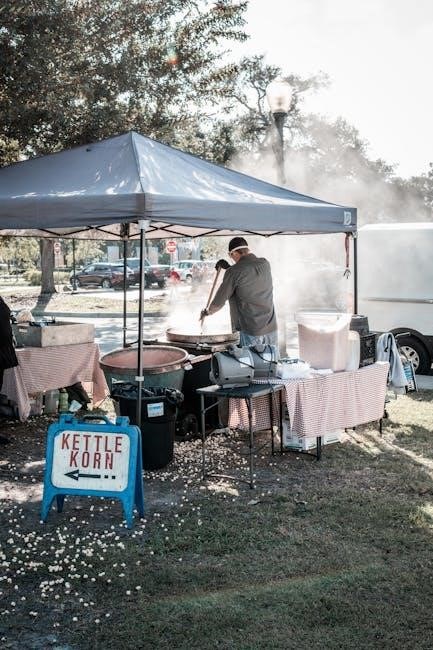florida will pdf free
A Florida Last Will and Testament is a legal document outlining how an individual’s assets are distributed after death. It is available as a free PDF template online, allowing residents to declare their final wishes regarding property and estate management effectively.
1.1 Definition and Purpose
A Florida Last Will and Testament is a legal document outlining how an individual’s assets, property, and estate will be distributed after their death. Its purpose is to ensure the testator’s final wishes are respected, appoint an executor, and designate guardians for minors. It provides clarity and control over asset distribution, reducing potential disputes among heirs. Free PDF templates are widely available online for drafting this essential document.
1.2 Importance of Having a Will in Florida
Having a Florida Last Will and Testament ensures your assets are distributed according to your wishes, preventing state intestacy laws from dictating the division of your estate. It allows you to appoint a trusted executor, designate guardians for minors, and specify funeral arrangements. A will protects your family from potential disputes and ensures your legacy is managed as you intend, providing peace of mind for your loved ones.
Legal Requirements for a Valid Will in Florida
A Florida Last Will and Testament must be in writing, signed by the testator, and witnessed by two individuals. The testator must have legal capacity to create the document.
2.1 Age and Capacity Requirements
In Florida, a testator must be at least 18 years old to create a valid will. They must also possess the mental capacity to understand the nature of their actions, meaning they must be of sound mind and not under undue influence when signing the document.
2.2 Signature and Witness Requirements
A Florida will must be signed by the testator and witnessed by at least two adults who are not beneficiaries. Witnesses must attest that the testator signed willingly and appeared mentally capable. While notarization isn’t legally required, it’s recommended to make the will self-proving, simplifying the probate process by avoiding additional witness testimony.
How to Create a Florida Last Will and Testament
Download a free Florida will PDF template, fill in personal details, designate heirs, and outline asset distribution. Ensure all sections are completed accurately for legal validity.
3.1 Step-by-Step Guide to Filling Out the Template
Step 1: Download the Florida will PDF template. Step 2: Enter your name, address, and marital status. Step 3: List your heirs and beneficiaries. Step 4: Describe how assets will be distributed. Step 5: Name an executor and alternate. Step 6: Include witness signatures and notarization for validity.
3.2 Key Sections to Include in the Will
A Florida will should include testator information, beneficiaries, asset distribution, and an executor. It should also cover guardianship for minors and special instructions for property management. Witness signatures and notarization are required for validity. Including these sections ensures clarity and compliance with Florida laws, making the will legally binding and effective for estate distribution.

Free Florida Last Will and Testament PDF Download
A Florida Last Will and Testament is a legal document available as a free PDF download, allowing individuals to outline asset distribution and final wishes effectively.
4.1 Where to Find Reliable Templates Online
Reliable Florida Last Will and Testament templates can be found online through official state legal websites, trusted legal aid organizations, and reputable document providers. Many platforms offer free PDF downloads, ensuring accessibility for residents to create a valid will. Always verify the source for accuracy and compliance with Florida state laws to ensure the document is legally binding and up-to-date.
4.2 How to Download and Print the PDF
To download and print a Florida Last Will and Testament PDF, visit reputable legal websites or official state resources. Select the correct form, download it as a PDF, and print it on high-quality paper. Ensure the document is filled out clearly and signed in the presence of witnesses to meet legal requirements for validity in Florida.
Executing the Will in Florida
Ensure the will is signed willingly by the testator in the presence of two witnesses. Notarization is recommended for self-proving. Store the document securely to avoid loss or tampering.
5.1 Witness Requirements and Notarization
In Florida, a will must be witnessed by two individuals who are not beneficiaries. They must acknowledge the testator’s signature in person. While notarization is not mandatory, it is recommended to make the will “self-proving,” simplifying the probate process. The notary public verifies the testator’s identity and the witnesses’ signatures, ensuring the document’s authenticity and compliance with state laws.
5.2 Storing the Will Safely
Store the original will in a secure, fireproof location, such as a safe or safe deposit box. Ensure the executor knows where it is kept. Avoid storing it in a locked box without informing the executor, as this could delay probate. Consider keeping a digital backup in a secure online storage service. Review and update the storage location annually to maintain accessibility and security.

Benefits of Having a Florida Last Will and Testament
A Florida Last Will ensures assets are protected, loved ones are provided for, and final wishes are honored. It avoids probate complications and ensures proper distribution of property.
6.1 Protecting Assets and Family
A Florida Last Will safeguards your assets, ensuring they are distributed according to your wishes. It protects your family by clarifying inheritance, avoiding disputes, and providing for dependents. This legal document guarantees that your loved ones are cared for and your property is managed responsibly after your passing.
6.2 Avoiding Probate Complications
A Florida Last Will and Testament helps bypass lengthy probate processes, streamlining asset distribution. By clearly outlining your wishes, it reduces legal disputes and ensures a smoother transition of your estate. This saves time and minimizes costs for your beneficiaries, providing peace of mind and financial security.
Common Mistakes to Avoid When Creating a Will
Common errors include improper witnessing, unsigned documents, and vague language. Omissions in asset distribution and outdated information can lead to legal challenges. Ensure careful drafting to prevent disputes and ensure your wishes are honored.
7.1 Errors in Witnessing or Signing
Florida requires a will to be signed in the presence of two witnesses. Failure to secure proper witnessing or notarization can render the document invalid. Ensure all signatures are voluntary and witnessed correctly to avoid legal challenges. Improper signing procedures are among the most common issues that lead to will contests and estate disputes.
7.2 Omissions in Asset Distribution
Omissions in asset distribution are common mistakes in DIY wills. Failing to list all property or not specifying beneficiaries can lead to legal disputes. Ensure clarity in designating heirs for each asset. Ambiguous instructions may result in probate delays. Always double-check the document to confirm all possessions are included and properly assigned to avoid unintended outcomes and family conflicts after death.

Estate Planning Beyond the Will
Estate planning extends beyond a will, incorporating trusts, powers of attorney, and beneficiary designations. Regularly updating your will ensures alignment with life changes, creating a comprehensive estate plan.
8.1 Trusts and Other Estate Planning Tools
Trusts are a key component of estate planning, offering flexibility in asset management and distribution. They can bypass probate and ensure privacy. Other tools include powers of attorney and beneficiary designations, which complement a will by addressing incapacity and specific asset transfers. Together, these tools create a comprehensive plan tailored to individual needs and goals, ensuring efficient asset protection and distribution.
8.2 Updating Your Will Over Time
Life events such as marriage, divorce, births, deaths, or significant changes in assets or laws may necessitate updating your will. Regular reviews ensure your wishes remain accurate and legally binding. Consulting a legal professional is advisable to incorporate changes smoothly and maintain compliance with Florida’s legal requirements for will execution, including witnesses and notarization for validity.
Where to Get Help with Your Florida Will
Consulting an attorney ensures compliance with Florida laws. Free legal resources and online templates provide accessible tools for creating a valid will.
9.1 Consulting an Attorney
Consulting an attorney ensures your Florida will is legally sound and tailored to your needs. They provide expert guidance on estate planning, asset distribution, and compliance with state laws, avoiding costly mistakes. Attorneys can also address complex situations, such as blended families or special needs considerations, offering personalized solutions. Additionally, many legal professionals offer free initial consultations or affordable services to help you create a valid will.
9.2 Free or Low-Cost Legal Resources
Florida residents can access free or low-cost legal resources to create a valid will. Legal aid organizations, such as Florida Legal Aid, offer free assistance to low-income individuals. Additionally, many online platforms provide free Florida will PDF templates that can be downloaded and customized. Local libraries and community centers may also offer free legal clinics or workshops on estate planning. These resources help ensure everyone can create a will without high costs.

Top Resources for Florida Will and Testament
Top resources for a free Florida will PDF include trusted websites and legal aid organizations offering downloadable templates. These platforms ensure accessibility and compliance with state laws.
10.1 Recommended Websites for Free Templates
Recommended websites for free Florida will templates include PrintFriendly, offering downloadable PDFs, and legal aid sites providing customizable forms. These platforms ensure compliance with Florida laws and are user-friendly, allowing individuals to create and print their wills efficiently. They often include step-by-step guides and cover various estate planning needs, making them reliable sources for residents seeking free resources.
10.2 Legal Aid Organizations in Florida
Florida Legal Aid organizations offer free or low-cost assistance with wills and estate planning. Groups like Florida Legal Services and local non-profits provide resources, templates, and legal guidance. These organizations ensure low-income individuals can access necessary legal documents, such as a Florida Last Will and Testament PDF, to protect their assets and family without financial burden. Their services are widely accessible statewide;

